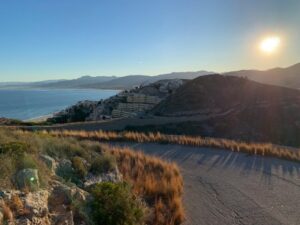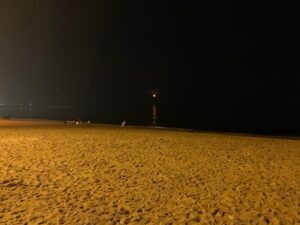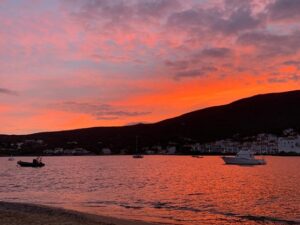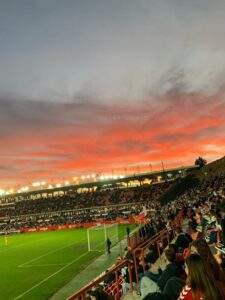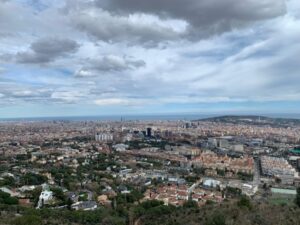Writing a master thesis in Italy
- Plastics and Textile Technology M.Sc.
- Italy, Bollate(MI)
- SYENSQO Specialty Polymers Italy S.p.A.
- 10/2023-03/2024
Application/Finding a master thesis
As in most study programs, you can choose to write your thesis at the university or externally in a company. For this reason, it was clear to me at an early stage that I wanted to write my Master’s thesis externally in order to gain further important practical experience. The contact to the former SOLVAY (SOLVAY has outsourced its Specialty Polymer Business Unit and founded its own company, which is now called SYENSQO) was made via the IKV Recruiting Speed Dating. There I was able to get to know my current supervisor in a brief in
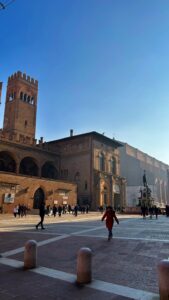
© Cihan Koyuncu
Bologna
terview and discuss my ideas about an external master’s thesis. It was no problem to get a confirmation, as both sides were interested in carrying out a Master’s thesis. As the Bollate site has never had a Master’s student outside of Italy before, in addition to the selection of the topic, a number of things had to be clarified with regard to insurance, contract, payment and other regulations. These points were resolved within almost a year via several meetings with various departments of the company or the university, so that I was able to start in Italy on time on 01.10.2023. For a good planning of a stay abroad, 9-12 months should be taken into account. If you are going to work abroad, you should find out about tax matters in advance. In the case of Italy, a Codice Viscale is required, which you can apply for at any Italian embassy in Germany.
Accommondation & Living expenses
Since I needed a furnished apartment, I used AirBnB to ask the various apartment providers for a long-term contract. This allowed me to reduce the price a little, as I was able to save on Airbnb’s fees and they were able to accommodate me in terms of price due to the 6-month stay. As Italians rarely speak English, there were considerable communication problems with some of the locals. For this reason, communication often took place via Deepl in order to at least get the message across. Financing an apartment in Milan would not have been possible despite the salary and the Erasmus money. That’s why I first lived in Limbiate and later in Magenta. This saved me the high rents in Milan. Nevertheless, I had to spend more on gas and have to travel 30-60 minutes to get to work, depending on the traffic. The remaining costs were comparatively slightly lower than in Germany. Despite this, I was able to travel a lot and generally had a very good time in Italy. Many museums and attractions are free for young adults under 25. Restaurants are comparatively cheaper as German restaurants and the quality of the food is significantly better. I was able to save some money, because the meals at work were free for me.
Everyday life/the internship
I had a 40-hour contract and therefore spent 9 hours a day in Bollate including a break. In the morning I left the house at 8:30 a.m. and was there at around 9:15 a.m. Because the working hours were flexible, I was able to come and go whenever I wanted. The most important thing was that I fulfill my tasks with high quality and at the same time deliver them on time. Due to the early work traffic, I deliberately drove to work later and was therefore able to reduce travel times. Whenever my supervisor worked from home, I was also allowed to work from home. At Syensqo, in addition to my master’s thesis, I took part in regular work operations and was therefore able to help out with some projects on the side. I was able to get to know many colleagues from the site, exchange ideas and work together. Among other things, we had contact with colleagues in Lyon, France and Alpharetta, USA. The lunch break enabled me to get to know my colleagues better.
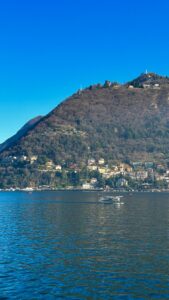
© Cihan Koyuncu
Lake Como
Here in Italy great value is placed on food culture. In the canteen there is a first (primi) and second (secondi) course in addition to salad and dessert every day. After every lunch break we sat down together for an espresso. Afterwards you were fit enough to devote yourself to work again.
The master’s thesis was about the comparison of high-performance tribological plastic compounds with and without PTFE. I examined the tribological parameters (COF, wear, PV limit) of various compounds and compared them with each other. This made it possible to determine the effect of graphite and other tribological additives on the tribological properties. In addition, two different methods for determining the tribological properties were compared.
After work there wasn’t much time left for other activities. I often did sports or studied for upcoming exams in the evenings. I was also allowed to fly back to Germany for the exams and work from my home office for several weeks. I was also able to get to know SYENSQO’s German location in Duesseldorf. What pleasantly surprised me was that even in Germany the colleagues were international. My colleagues were therefore predominantly Italian, but there were also some French, Austrian, Irish, Turkish and German colleagues. The working language was English, which is why my English improved significantly over these six months. But I also had the opportunity to learn some Italian.
It was particularly exciting to find out about everyday matters in Italy, all of which are different in Germany. Shopping, paying tolls or even washing the car was a bit of a challenge at first, but we were quickly able to figure it out with the help of the internet and by asking the locals. Even though many Italians were either unwilling to speak English or simply couldn’t speak it, a lot was communicated via gestures and facial expressions and, if necessary, communicated directly in Italian using Google Translate.
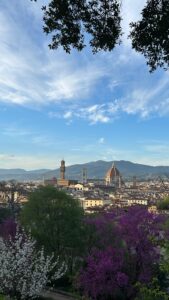
© Cihan Koyuncu
Florence
Free time/tips
During the six months I was there, I wanted to see as much of Italy as possible. That’s why I spent most of my free time at the weekend travelling around the cities. The cultural sights and churches in particular are a definite must-see. The train connections in Italy are very good, much more punctual than in Germany and comparatively cheaper. I often slept in cheap hostels so that I could finance this amount of travelling. You can be lucky, but you can also be unlucky, which is why it’s well worth doing your research beforehand. Most sights in Italy are free for EU citizens under 25. Student discounts are rare, but in the cases where they were offered, I often didn’t have to show anything. Tickets for attractions could often be booked online in advance, which saved precious waiting time. However, you often had to pay by credit card. Here is a list of the cities I visited and my most important tips for a stay there.
Milan
Despite the fact that it is a world metropolis, Milan is actually the city that is least worth seeing in my opinion. This is not because the city itself is not beautiful, but rather because I liked all the other cities much better. The main sights in Milan are the cathedral and the Galleria Vittorio Emanuelle II, both of which are located directly on the cathedral square. You can visit the cathedral and even go up to the roof of the cathedral. Milan’s Arc de Triomphe and the neighbouring park are also very beautiful. If you walk through the park, you quickly come to a former castle, which you can also visit. There are many culinary options in Milan. Above all, a visit to China Town is worthwhile, especially in the evening. You can also visit the Cimitero Monumentale (Milan’s old cemetery) with its incredibly beautiful sculptures and tombs. Important Milanese personalities are also buried there, so it’s worth checking out who is buried there first. You can also visit the original “Last Supper” by Da Vinci in Milan. However, getting tickets for this was much more complicated than usual, which is why I unfortunately missed it.
Como
If you live near Como, I think it’s worth making several trips to Como and especially to enjoy the beautiful view.
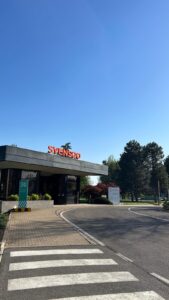
© Cihan Koyuncu
Syensqo
Como is located on Lake Como and from there you can visit the numerous small villages on the lake. It is probably one of the most beautiful places in Italy, especially in summer. In Como, you can also book tickets for a boat tour that will take you to the villages on the lake.
Bergamo
Bergamo is one of the smaller cities in the Milan metropolitan region. Bergamo’s old town is situated on a hill, so you can either climb up the numerous steps or take the mountain railway (€1.70 each way). A beautiful old town centre awaits you at the top. The two churches on the market square are particularly worth a visit. I can particularly recommend foccacia at Il Fornaio and the original and first straciatella ice cream at La Marianna. A short day trip is enough to fully explore Bergamo.
Verona
Verona also has a beautiful old town centre. I was only able to stay there for a few hours on the way back from Venice. I can only encourage everyone to visit this city. Verona is also the city of Romeo and Juliet.
Venice
I don’t think I need to say much about Venice. Beautiful city with numerous canals, but unfortunately with a lot of tourists. Even if you just stroll through the streets of Venice, you can see a lot of beautiful things there. The big sights are definitely the Doge’s Palace and St. Mark’s Basilica. The Venice Opera is definitely worth seeing.
Turin
Very few people have an eye on the city on the Po. Still a very beautiful city that is definitely worth a day trip. The Musei Reali contains some really beautiful art and should definitely be visited. There is also a very nice car museum in Turin for all car enthusiasts. But definitely don’t miss the opportunity to take a walk along the Po.
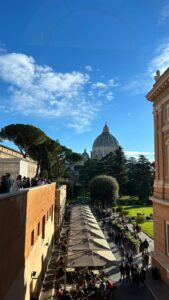
© Cihan Koyuncu
Vatican
Genoa
The largest connected old town in the world can be found in Genoa. I was rather suspicious when I looked at the pictures on the Internet, but I was even more enthusiastic about this city once I was there. Therefore a must for everyone who wants to see a very extravagant, very wealthy city in Italy with a French flair.
Florence
The city of the Medici, an absolute must-see for anyone who has been to Italy. The Galleria dell’Academica and the Uffizi are a must-visit, especially for art enthusiasts. There you can see, among other things, the impressive original David sculpture. The magnificent Duomo in Florence is beautiful from the outside. But save yourself the waiting time and don’t go in, as it’s even bareer inside. For everyone who likes to learn about the history of Italy and Florence. Most and important Medicis, Donatello and 1-2 popes are buried in the Medici Chapel. You can get a good view of the city from one of Florence’s gardens, but you have to pay an entrance fee. Instead you can go to Piazzale Michelangelo and watch the sunset from there. You can get a good view of the city from one of Florence’s gardens, but you have to pay an entrance fee. Instead you can go to Piazzale Michelangelo and watch the sunset from there.
Rome
You should generally plan 3-4 days for Rome because you can see so much. Therefore, you should plan well in advance. The only tip I would like to give about Rome. Be sure to book tickets for the Vatican Museum in advance (1-2 weeks in advance). Otherwise you have to wait in line for up to 3 hours. But it was still worth it because you can see, among other things, the Sistine Chapel and with it the famous chapel painting by Michelangelo (The Creation of Adam).
So as became clear, spending time on weekends, holidays and good planning meant I was able to travel a lot. Even though this meant foregoing most of the other luxuries, I think I made the most of my time in Italy.
Conclusion
I am very satisfied and grateful for the opportunity to have been abroad. This would not have been possible without the support of Erasmus+. Not only was I able to gain important experience but I was also able to grow as a person. Living abroad is an experience that I would recommend to everyone and that will definitely provide personal growth. From today’s perspective I might approach certain points differently, but overall I’m very happy with how these six months went. The six months at SYENSQO also showed me what the working world looks like in other countries and how it can differ from that in Germany. Important experiences that I will carry with me in my life regarding international understanding. I can only recommend that everyone take a stay abroad as part of their studies. Above all, I can recommend everyone to visit this beautiful country, absorb the culture and experience all the beautiful things that I could only touch on here as part of the report.
Working as a Foreign Language Assistant in Dublin
- Master of Education
- Ireland, Dublin
- Colaiste Chilliain
- 10/2023 – 03/2024
1. Application/Finding an internship
I first learned about the “Foreign Language Assistant” program through friends. The application process
was comprehensive but straight-forward and needed to be completed by January. It required submission
of a CV, Letter of Motivation, transcript of records, certificate of study, and a university report
(Hochschulgutachten) from a Professor (some documents needed to be submitted in English + German,
this varied according to your chosen destination country). The program encompassed numerous countries
with varying internship durations but Ireland, offering a placement of 6-8 months, resonated most with my
preferences. Moreover, Ireland was one of the very few destinations that allowed me to indicate preferences
according to the destination COUNTY. I could give three preferences and chose county Dublin as my first,
since I expected this would be the spot with the highest frequency of FLA placements (which turned out
true!). Following the initial application, I progressed to the second stage, receiving an invitation for an
interview with representatives of PAD in March. In May, I was then finally informed that I had been accepted
to the program, so I immediately applied for Erasmus funding and a break semester (Urlaubssemester). By
June 1st, I received my school assignment along with the instruction to contact the principal and introduce
myself immediately, since Ireland would be starting the summer holidays on June 2nd. I did as told and
received an answer on the same day.
2. Accomodation & Living expenses
I started looking for accommodation as soon as I got the notice, but I quickly discovered the harsh realities
of Dublin’s sky-high prices and housing issues. I searched platforms like Daft.ie and HostingPower which I
was told about by a former FLA. There were new offers daily on Daft.ie, but most were either extremely
expensive, seemed rather unpleasant or were labeled as “on a mon-fri basis”. Additionally, HostingPower
operates on a commission base, which means you pay a fee if you find accommodation through their
agency. However, the offers on HostingPower are always reviewed and approved of by their staff, so the
places are usually nicer than on Daft.ie. I think it’s important to point out the following: almost all options
were rooms inside a family home – there were almost no student flat-shares (WGs), which I was a little
struck by, since Dublin is a rather large University city that houses a lot of students. So prepare yourself to
live with a “host” family. I came upon the question of whether to prioritize proximity to school or the city
center and initially decided on the latter, but the matter was decided FOR ME by the housing crisis itself,
leaving me little room for choice. I contacted countless ads for weeks but only two even replied in total.
Eventually, I managed to secure a room in a suburb/town through Daft.ie, that meant a good 50-minute bus
ride from the city and 25 minutes from school. Looking back I wouldn’t call this a problem since there were
so many buses that operated between my place and the city center which made going up to Dublin really
easy. However I still find the rent of 800€/month PLUS expenses like gas, electricity, and WiFi adding
another 100€/month very excessive for a room 50 mins from the city center. But this seems to be the reality
you have to face when moving to Dublin, most of the other FLAs had similar rents. My experience with my
landlady however was rather unpleasant. She acted welcoming at first but then later expected me to
basically disappear into thin air every time she was home. She would prefer if I could manage it so that she
“doesn’t really notice I’m there” (???) She gave me a list of time slots in which she’s not home and asked
me to please limit my time in the common rooms (e.g. to cook meals, do laundry, shower etc.) to those time
slots and to otherwise be quiet (she didn’t use those words directly, but that is what she expected). She
was downright delusional. It made the living situation really uncomfortable but in the end I managed to work
around her. This was just MY unlucky experience, other FLAs had great flats – I guess you can never know
if your pick was good until you live there a few weeks. There is no strategy to the housing matter, you just
need a little luck which I hope you will have!!
What you will have to acquaint yourself with is that Dublin in general is a rather expensive city. Still I would
say in hindsight that your salary plus your Erasmus grant will be enough. I didn’t really have to restrict
myself expenses or count every penny though I still tried to spend responsibly. I prioritized trips and
brunches/dinners over pubs and beers, but that is just my personal preference :). Also, a lot of museums
and galleries are free for students or at least discounted. The offers for students are great, so make sure
to look into that. Grocery shopping I mostly did at Lidl and Aldi which are the cheapest options. The Lidl+
App is a game changer when trying to save money, they have amazing offers, you just need the app. Tesco
and Dunnes are great for meal deals and offer a larger assortment. They also have saver options
(Clubcards), but you need an irish phone number to apply for those, I think. Public transport fares like
busses, the Luas (tram), and the Dart (train) are way cheaper if you have a student leap card. It’s an ID
card that you apply for online. You use it to pay public transport and top it up with money via an app. The
whole concept is brilliant if you ask me, there is even a weekly limit to your spendings, which means if you
reach that limit, you travel for free. Cosmetics (shampoo, make-up, moisturizers) and anything drugstore related are really expensive compared to Germany, so if possible, stack up on those at home. You prettymuch will not need cash anywhere, which I found to be really handy. Everything is paid by card, some
places don’t even take cash. My German debit card worked perfectly fine but I switched over to a Revolut
account (including a digital debit card) since I had to pay my rent via Revolut as well.
3. Everyday life/ the internship
I worked at an Irish secondary school on a 12h/week basis. The 12 hours were to be completed from
Monday – Thursday, Friday was a day off. All FLAs usually get either Monday or Friday off in order to be
able to take trips and explore the country. We were all very fond of this rule . So at school I attended 12
German lessons divided between two German teachers. The classes at my school were 60 minutes each,
but other schools also had 45 minute classes.
As a Foreign Language Assistant, my main task at school was to assist the teachers in their lessons. In my
case, this really meant “just assisting” in the beginning. I watched the lesson and helped students where
help was needed. Later on, I planned out little bits about German culture, geography, holidays. I reached
out to the teachers with my ideas, but to my surprise I often heard back “Oh that sounds lovely, but I’m
afraid we have such a tight schedule, maybe next class” or something along those lines. So all in all my
main tasks at school did not really include educating about German culture but rather just assisting and co-teaching stuff from the textbook.
I also did a lot of correcting class tests, vocab tests and homework
assignments, which I enjoyed a lot. Occasionally I did some one-on-one work with students who needed
some additional practice and I helped prepare the leaving cert students (Abiturjahrgang) for their final
exams in German. Looking back on my time, I can say that my role as Language Assistant was not very
well defined. On some occasions, the teachers didn’t seem to know how to make effective use of me and
my qualities. At the end of the day, I still believe that my work affected the students in a positive way and
made them realize that there can be fun in German class, but I would have preferred to be a little more
involved – especially because I expected this program to enable me to improve my own teaching skills /
lesson planning. However, the rather “small” workload (in my case!!!) enabled me to prioritize exploring the
country, which I’m definitely not mad about!
A major issue that I struggled quite a bit with was the language of interaction at school. Technically, Irish
the official language in Ireland but in reality, it is rarely used in day-to-day life. Only some regions on the
Westcoast (they are called Gaeltachts) actually speak Irish daily. The majority of Ireland’s people don’t
speak the language fluently. However, some schools in the greater Dublin Area made it their mission to
revive Irish as a spoken language and bring back some of the forgotten culture (which is an amazing
proposition!). Those Gaelscoils use Irish as the language of interaction and instruction, which means that
no English is spoken at any time by any person on the school grounds. Turns out, I was allocated to a
Gaelscoil. I don’t speak Irish. Sounds quite non-sensical, huh? Spoiler though: It all turned out fine and was
actually really interesting! Of course, the staff and students were all very considerate and always used
English when talking to me. However, there were still some things that I struggled with and made me feel
a bit lost at times. Interacting with my colleagues and just casually chatting in the staff room can be hard
when everyone around you is speaking a language you don’t understand. You can’t just casually drop into
a conversation you overheard with a “oh yeah, that exact thing happened in my class last Friday, too” or
“What is the name of that pub you’re talking about?”. This led to me not really feeling close to most of my
colleagues, I mostly talked to the German teachers I was assigned to. One of them was actually half
German half Irish, we got along really well and she didn’t speak Irish either, meaning her lessons were held
in English. My other teacher strictly spoke Irish during the German lessons which made me feel a bit left
out and awkward. My time at the school was challenging in some ways, but we made the best of it! I learnt
a lot about Irish culture and picked up some bits of Irish, which was fun!
4. Free time/tips
As I said, the FLA program is designed to give you the time and space to do travelling and exploring, which
is fantastic. Most of my weekends were spent with other FLAs in the Dublin Area, we planned a lot of
activities in Dublin and trips around the country. We went out for brunch, coffee and dinner a lot, most of
us not being heavy drinkers so we prioritized restaurants and cafés over pubs. Dublin offers uncountable
options. Just go strolling through town and every 2 minutes you’ll walk past a place that you’ll want to try.
Activity-wise I recommend checking out everything that is free (or discounted) for students: museums, art
galleries, markets. Free-walking-tours are a great way to get a first impression of the city’s must-see places
AND hidden gems. In general, Ireland’s nature and national parks are great for hiking. Sadly, most of the
spectacular hikes are not accessible via public transport, but renting a car to do a trip with some friends is
definitely worth it. Driving on the lest side might be intimidating at first, but you’ll get the hang of it in no
time! Keep in mind though that roads on the countryside can be very narrow and curvy and driving in the
city can be stressful. I recommend renting a car at the airport, since that is usually a little further outside of
the city. During the mid-term break (one week off school in November and February) we took a trip to
Scotland, which was a real highlight. Below you will find a list of recommendations
– Trips around the country
o Kilkenny – 2 hours from Dublin, cute small town, beautiful norman castle
o Galway – 4 hours from Dublin, west coast flair, very cute around Christmas time
o Cork – 3 hours from Dublin, great town & university
o Belfast – Northern Ireland, very pretty city
o Sligo – Sligo city is rather dull but it’s close to Strandhill, surfers paradise, great hiking
options in the whole county (e.g. Queen Maeves grave)
o Killarney + Ring of Kerry – great national park, amazing views, Paddywagon does a great
bus tour
o Wicklow Mountains
– Trips to other destinations
o Edinburgh + Glasgow – great cities
o Scottish highlands – amazing views
– To do in/around Dublin
o Howth cliff walk
o Bray + Bray head
o Malahide + castle
o EPIC Museum
o Craic Den Comedy Club
o Irish Film Institute (for movies)
o Brunch at “Joy of Cha”
5. Conclusion
To conclude: I would recommend doing the FLA program to anybody wanting to explore Ireland (or any
other country they offer). Working at a school and „teaching“ German will give you a whole new perspective
on your own language and it will benefit you in a lot of ways! The Erasmus+ internship grant will enable you
to make the most out of your time. This experience along with all the lovely people I met are now a part of
me that I never want to miss! Time spent abroad will always have some ups and downs, but you will gain
so much from every experience (positive AND negative)
Research Internship in Valencia
- Chemistry M.Sc.
- Spain, Valencia
- Universitat de València
- 01/2024 – 04/2024
Application and finding an internship:
After careful consideration, I was convinced that Valencia was the right city for me. I had heard many good things about Valencia: the city seemed to offer what I was looking for, and, as I expected, people spoke “normal” Spanish.
Subsequently, I wrote emails with my resume and academic transcripts to professors and group leaders at universities and some independent institutes. My recommendation would be to reach out to as many as possible. Out of 25 recipients, approximately 15 responded; 10 were unavailable, lacked capacity, or only took interns for longer periods. Among the 5 positive responses, I scheduled short meetings with 2 individuals to make the most informed decision possible. In the end, I decided to do an internship in inorganic chemistry at the University of Valencia. The professor spoke good English, the laboratories were spacious and modern, and I had the feeling that they were happy to have an additional motivated employee.
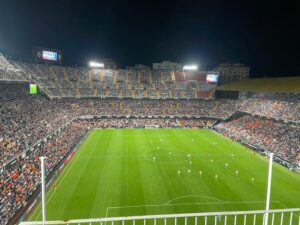
© Jona Sieberg
Accommodation & Living Expenses:
I found searching for accommodation from Germany, without knowing Spanish, to be quite challenging. While many recommended Idealista as the best possible website, where you can find a lot, I ultimately found my apartment through Uni-Places. Although there was a fee involved, it also provided a certain level of security against scams. I live incredibly centrally, not really close to the university, but with the free public transport (for people under 30), I can reach my workplace in 35 minutes. However, I have found Valencia to be very well connected, so the exact location of your flat is not so important.
When I first started looking for an apartment I would have liked to live alone, but decided to go for the cheaper option of a shared flat. In retrospect I would now strongly advise everyone to do the same. Social interaction and contacts are one of the core elements of an Erasmus stay, which should not be missed at any point. Based on my experience with shared accommodation and hearing about others’ experiences, there will always be pros and cons, but I have not heard from any situations that were unbearable.
Sidenote: During the summer months, a room without air conditioning is maybe somewhat bearable but not very desirable.
Monthly expenses for groceries in the supermarket are certainly somewhat lower than in Germany, although not by much. The only thing that is a little more expensive than what we are used to is Ice-cream. Everything else depends on your lifestyle.
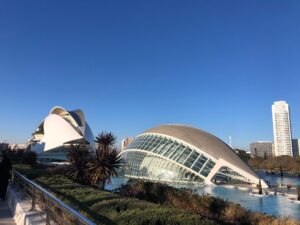
© Jona Sieberg
Prices for shared rooms range from approximately 300 to 550 euros. Clubs are often free through Erasmus organizers, and restaurants and gyms are also slightly cheaper than in Germany.
Everyday Life / The Internship:
My internship itself didn’t really differ from similar tasks in Germany: I worked in the laboratory, sometimes under supervision, mostly independently. Only the feeling of arriving in a group of Spanish people, making friends, and then also doing things together outside of university felt even cooler. I dealt with great people, a relaxed yet dedicated professor, a doctoral student with whom I couldn’t have gotten along better, and a generally very friendly group. The willingness to help each other was high, working hours were very flexible, and hierarchies were flat.
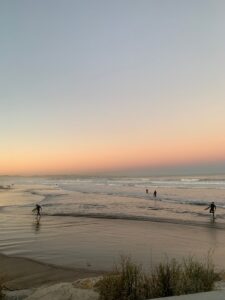
© Jona Sieberg
In this regard, my impressions were minimally different from Germany. I was usually in the lab between just before 10 am and 6 pm, but as everything was relatively relaxed, a lot of it was voluntary. Overall, there was certainly time for sports, activities on the weekends, and enjoying the feeling of living in Spain! I found it to be a great opportunity to expand my knowledge, learned a lot, and certainly gained more confidence in my abilities through the experiences I had.
The biggest difference in everyday life: You don’t have to look out the window to know what the weather is like. Valencia lives up to its promises and offers, although it may not be the most beautiful city in the world, good weather, nearly every day.
My hope was to make great progress in Spanish as well as gaining professional experience. This is perhaps possible if you already speak relatively good Spanish, but as long as English is still much easier for both sides, I had little success. The university, as the place where I spent most of my time, is simply unsuitable for this, as people here speak generally better English than elsewhere.
Free Time / Tips:
Beach, great weather, culture, local markets, the feeling of a big but not too big city, clubs, parks, huge university campuses, and all of it easily accessible. As mentioned, there is certainly no shortage of options. Erasmus organizations offer a particularly easy entry, offering a variety of activities. For example, I participated in their surfing and beach volleyball offerings, parties, and excursions. The excursions, in particular, are very pleasant because you can reach nearby cities or locations relatively inexpensively. Especially the mountains, which are otherwise difficult to reach without a car.
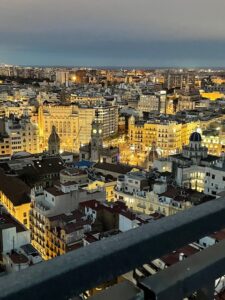
© Jona Sieberg
Valencia certainly does not lack bars where you can sit down nicely in the evening. Additionally, there are also many opportunities to sit outside with your friends. If I were to make a recommendation, I would suggest the very authentic Mercabañal, located very close to the beach.
As an absolute Erasmus hotspot, one should not expect to only deal with spanish people. On the contrary: It is very international, and this is reflected wherever students are. While I mainly dealt with Spaniards in the lab, my roommates and the visitors to clubs and bars were often from abroad.
I used my free time a lot to do sports, often in the gym, partly because it was often much cooler there. Running is a bit less pleasant in Valencia than in Aachen, but with the Turia (the largest park that leads in a semicircle through the city), there is an extremely bicycle and jogger-friendly park. Various football fields are also located here, where people often meet up through WhatsApp groups.
Conclusion:
I can highly recommend Valencia as a destination for an Erasmus stay. At the end of my time here, I feel like I have participated in the hustle and bustle of a Spanish university and made progress in my field, as well as had a great time in Spain. The only thing Valencia doesn’t offer is the feeling of being in a super fancy metropolis with incredibly modern skyscrapers. For everything else you hope for from your stay abroad, Valencia offers the ideal conditions. You just have to do it! Have fun!
Research Internship at DuPont de Nemours in Luxembourg
- Chemistry M.Sc.
- Luxembourg, Contern
- DuPont de Nemours Luxembourg
- 10/2023 – 02/2024
Application/Finding an internship
The Chemistry M.Sc. program at RWTH Aachen University requires three research internships, which can be completed externally, providing students with the opportunity of valuable work and life experience. While students can do an external internship in a specific research group, it is also possible to apply for an external industrial research internship. That is why I thought an internship at DuPont de Nemours in Luxembourg would provide me with valuable insights into the chemical industry, which is a potential career path for me as a chemist. DuPont de Nemours is one of the biggest chemical groups in Luxembourg and worldwide.
I took the initiative to organize my stay in Luxembourg and apply for this internship independently, without any recommendation from a professor or advertisement from the University. In October 2022, I reached out to one of the leading scientists at the company via email and after several months of communication, I was invited to an interview. Finally, in August 2023, I received the confirmation that I had secured the internship. This allowed me to have enough time to plan everything in advance before the start date. Based on my experience, I highly recommend planning an external industrial internship 9-12 months in advance.
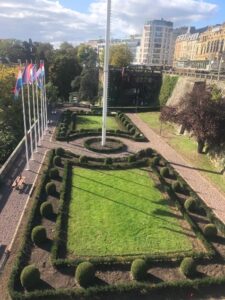
© Leon Maßem
Accommodation & Living expenses
My job was in Contern, a commune in the south of Luxembourg, east of the capital, Luxembourg City (usually referred to as the ‘city’). Finding an apartment close to the city for a reasonable price is almost impossible, as the price per square meter is close to 50€, making it impossible to finance with the Erasmus grant. I was happy to find and live in a small flat in the border area in the north-east of Luxembourg. The rent is lower and the opportunity to go shopping in Germany is very valuable. It is a fact that the cost of living in Luxembourg is 1.5 or even 2 times higher than in Germany for many products. Therefore, it is not surprising that many Luxembourgers prefer to go shopping in France or Germany. However, it is important to note that petrol, coffee, bread or tobacco are exceptions and this leads to fuel tourism in the border regions of Luxembourg. Wasserbillig is a city located on the border with Germany. It has 11 petrol stations, which I found quite amusing. Overall, I was not able to compensate all the cost with the Erasmus Grant and I had to use some of the salary that I got from work. Since the living expenses are that high, everyone should keep that in mind when planning on going to Luxembourg.
Getting around in Luxembourg is incredibly easy thanks to the country’s excellent public transport network, which is completely free.
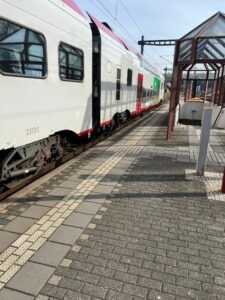
© Leon Maßem
Luxembourg is a relatively small country and the government invests heavily in its public transport system, making it possible to cross the entire country in just one hour or reach the city from the far east in just 30 minutes. This commitment was implemented to reduce car traffic which is a big problem when going towards the city. It’s no wonder that many cross-border commuters choose to rely on public transport when driving to work in Luxembourg. That is why I always chose to take the free train to work and I can recommend everyone to do so as well.
Everyday life/the internship
My contract was for a 40-hour week with 11 days of holiday over 20 weeks. I was pleased with the number of vacation days, especially since former interns at the company had reported receiving none.
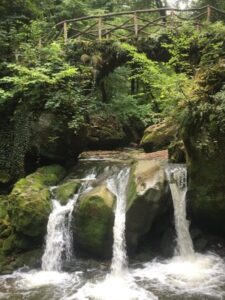
© Leon Maßem
I woke up at 6:00 am each day and left my home at 6:30 am by car. I took the option of travelling to Wasserbillig, which only took 10 minutes, and from there, I could take either the fast RE train (20 minutes to Contern) or the RB train (34 minutes to Contern). Trains arrive alternately every 15 minutes, resulting in a frequency of 4 trains per hour. I got on the train at 6.54am and arrived at Contern station at 7.18am. CFL’s service is highly reliable, better than DB’s and the train was almost always on time. Although, it is worth noting that some RE trains crossing Germany may cause delays. The company is located just a 5-minute walk from the stop.
I was given an electronic key card to enter the site and they are very strict about security. I worked in one of the R&D labs and had my own workstation with a laptop and all the equipment I needed. One of the main advantages was that, although I had to work 40 hours a week, I was able to set my own hours. As I arrived at 7.25am, I was able to leave at 3.55pm, which I loved. The team was very multicultural, from Belgian, Dutch, Greek, French to Irish. The main language of communication was English, which I got quite used to and learnt a lot. Additionally, I was able to improve my French by conversing with native speakers. I really enjoyed the interaction with so many different cultural influences, the openness and diversity. In general, no one looked down on anyone, even with PhD titles, and the atmosphere was productive and it felt like a good collaboration.
The lab itself was top class in terms of equipment and they had very good and many GCs, LC-MS, GC-MS, IR, DSC and much more that you would not expect to find in many research groups in Aachen. Although I cannot talk about my work itself, I can say that you work very independently and they give you space and time to work on your own. I had regular meetings not only with my local colleagues but also with colleagues from the US. I felt very valued and involved in their day-to-day work with my own project. However, you really feel the pressure to produce results as they expect you to present what you have done and thought about in these weekly meetings. I was able to improve my laboratory techniques, enhance my research and collaboration skills, and participate in productive meetings with common problem-solving issues.
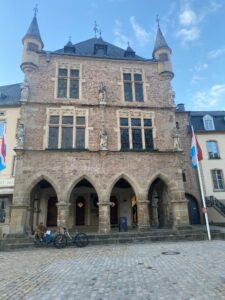
© Leon Maßem
It is definitely difficult to work at university, but I recommend everyone to experience it, as this is what most students will be working on in their future anyway.
Free time/tips
You work a 40-hour week and the work was more demanding than at university. I started in October and left in February, which meant that the sun was almost down when I got home, which made it difficult to do much outside activity during the week. I usually went out on Saturdays and Sundays, although apart from the city itself I found Luxembourg a lot quieter than Germany. However, Luxembourg has really beautiful nature and I would recommend at least visiting the very famous Müllerthal in the east with the Schiessentümpel waterfall if you like hiking. I would also recommend a visit to Vianden Castle in the north-east, which was not far from where I lived. The castle was renovated in 1977 when it was taken over by the state and is very beautiful. You can visit the castle from 10:00 to 17:00 and students only pay 5€. There is also a medieval festival which is very famous but unfortunately only in the summer so I cannot tell you about it.
The oldest city in Luxembourg is Echternach and it is indeed very romantic and has beautiful historic buildings. I also enjoyed the nearby Echternach Lake, where you can go swimming in the summer. There are many different walking routes around the lake and they have tried to place many activities around these routes such as skill runs or giant trampolines. The city of Trier (Germany) is only about 30 minutes east of Luxembourg and is worth a trip if you like Roman buildings. If you are visiting Luxembourg, you must visit the city as this is where the main activities and shopping centre are. It only took me 30 minutes from Wasserbillig, the city is worth a full day trip. The city is divided into the lower and the upper part a
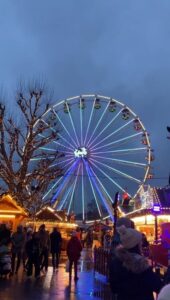
© Leon Maßem
nd I would recommend to start with the lower part and work your way up (you have to walk a lot of stairs though). The upper part has a lot of shops, but as the cost of living is so high, the prices are absurdly high. Be sure to visit the Grand Ducal Palace, as Luxembourg is still a hereditary monarchy and this is the city residence of the Grand Ducal family. A little further out is the Kirchberg area, which is the city’s banking and financial district. Luxembourg City is one of the three seats of the European Union. You can visit the European Court of Justice, the European Court of Auditors and the European Investment Bank. It is in direct contrast to the older city centre, but I still enjoyed it.
I joined a local football club that works with Germans and we met weekly. I would recommend asking around in your area as this helped me to get in touch with the locals and I enjoyed every time we met. Many even smaller villages in Luxembourg offer free sports facilities, so make sure you find out about them. I also went to the Christmas market in the city. When you enter from the train station, you make your way to the Place d’Armes, where most of the market takes place. It is interesting that they have rides like a giant wheel but again everything is very expensive and crowded. I enjoyed it but to be honest I prefer the Christmas market in Aachen.
Conclusion
Looking back, I am incredibly grateful that I had the opportunity to do a research internship within a company in such a wonderful country during my studies. I am happy that I am growing as a person and that I have made wonderful memories in Luxembourg in so many beautiful places all over the country. Although the country is small compared to its neighbours, it offers a diverse cultural density and beautiful nature. I believe that going to another country all by myself and working independently on my own project has helped me develop and is useful for my future. A disadvantage was definitely the high cost of living in Luxembourg, which limited some activities I wanted to do. However, I would highly recommend Luxembourg to anyone and will definitely visit the country again.
Internship in Bilbao
- Business Administration and Engineering: Mechanical Engineering M.Sc.
- Spain, Bilbao
- FEV Consulting Iberia
- 10/23 – 02/24
Application/Finding an internship
I started the internship search for an internship in Spain very early (about 5 months before the start of the internship), as it is advisable to expect sufficient lead time for applications
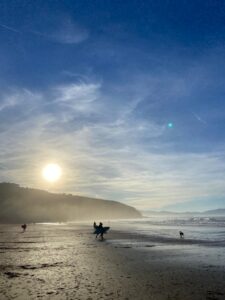
© Johann von Harling
Surfing beach in Sopelana
for internships abroad. I narrowed down the internship search to Spain because I am very interested in this country and also wanted to deepen my language skills. My approach to the application process involved systematically identifying companies in my area of specialization through internet research and searching for internship openings in the Career section of each website. Additionally, I also sent spontaneous applications to smaller companies. With larger companies, there is a greater likelihood that English is required or accepted as a working language. Many companies require foreign interns to complete the internship for longer than 6 months due to tax benefits, which limited my application to numerous companies. In the end, I found a German company with a location in Spain (Bilbao), which operates internationally in the field of technology consulting for the automotive industry and other technology sectors. I applied and had to go through the traditional application process for an internship in management consulting, consisting of two rounds of application involving interviews and solving a case.
Accomodation & Living expenses
For accommodation, I would recommend starting to look for apartments/rooms very early as well. Bilbao is one of the most expensive cities in Spain alongside Madrid and San Sebastian. Prices are generally comparable to those in German student cities, but they can also quickly rise to €600 or €700 for a shared room. However, it is also possible to find some very affordable rooms for around €300 with lower living standards.
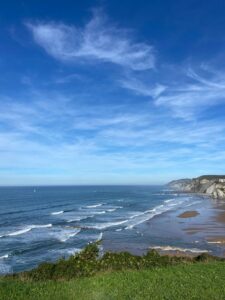
© Johann von Harling
Cost near by Bilbao
When viewing apartments, it is important to ensure that the windows are reasonably insulated for winter stays, and in summer, having air conditioning in the apartment may be necessary. When I arrived in Bilbao in October, the first few days were still very warm, with temperatures reaching up to 35°C. However, temperatures in winter also drop to very low values of around 0°C to 10°C, so having heating and well-insulated windows can contribute to comfort. Many students in Bilbao live in neighborhoods like Indautxu, Deusto, or Casco Viejo. However, there are apartments scattered throughout the city. Idealista is highly recommended as a portal for apartment hunting in Spain. Alternatively, you can also search for real estate agencies online. Bilbao is a relatively modern city for Spain, with many high buildings. On the other hand, it also has a beautiful old town area in Casco Viejo. The average living costs are quite comparable to the living costs in Germany although visits in restaurants and bars can be significantly cheaper from time to time. Prices in supermarkets are very much the same as in Germany, but the costs of a visit in bar or a restaurant can be regarding the restaurant a lot cheaper. It is also recognizable that Bilbao has one of the highest densities of Michelin Star restaurants in Spain and if you like you can as well try out the excellent cuisine.
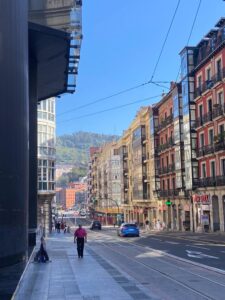
© Johann von Harling
Bilbao offering excellent transportation options with tram, metro, bus and train
Everyday life/ the internship
I completed the internship full-time, mainly in the office in downtown Bilbao. The atmosphere within the international team was very professional yet friendly outside of working hours. The predominant language in the company was English due to international projects. However, the conversation would also occasionally switch to Spanish or German, which I enjoyed and which contributed to improving my language skills in several languages. The internship involved working on technical projects, which were well-suited to the knowledge gained from studying industrial engineering. Projects in the field of electromobility, artificial intelligence, and general automotive production were the focus. The working hours for a consultancy were mostly between 8:30 am and 7:30 pm, which included most times a lunch break of half an hour to one hour, where we sat together with all the employees. Usually in the week most time was spent at the office and free time afterwards in walks around the various streets in the city and weekends were used to do bigger journeys and small trips within the near of Bilbao or other cites in Spain.
Free time/tips
Leisure time in Spain, especially in Bilbao, can be very diverse depending on the season. During the warm autumn days, trips for hiking, relaxing, swimming, and surfing along the coast of Bilbao are highly recommended. With the metro, you can reach the vicinity of the beach for €1.50 within 30 minutes and then reach it on foot after a short hike (15-20 minutes). The coastline consists of steep cliffs and long beaches. Additionally, you can also utilize the surrounding mountains near Bilbao on weekends for short hikes to get a view over the entire region. Bilbao is located in northern Spain, and there are many noteworthy cities nearby such as Santander, San Sebastian, Pamplona, Zaragoza, or even Madrid. The Cantabrian and Basque regions, in general, are highly recommended for excursions. A recommendation to create more leisure time during the internship is to strategically choose vacation days to have long weekends, allowing for short trips to more distant cities like Barcelona, etc.
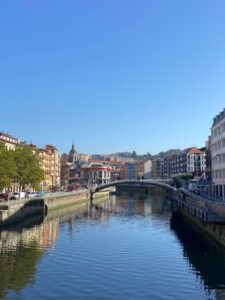
© Johann von Harling
Bilbao city quarters seperated by river
A recommendation for Bilbao is to explore the culinary diversity of Spanish specialties offered in many small local eateries. There is a rich culture of pintxos (tapas) available at many times of the day. Furthermore, Bilbao offers a lot of culture with the world-famous Guggenheim Museum or the football matches of the renowned Spanish football club Atletico Bilbao, which take place in the San Mames Stadium. I really enjoyed the internship because during that time, occasional team events were organized in which employees could participate, happening on weekends or after work. For example, there was the Bilbao Marathon, in which we could participate in various distances such as 10 km, half marathon, or marathon. During this race, the entire city was closed off for one evening, with about 13,000 people participating and many thousands more cheering on the streets of Bilbao.
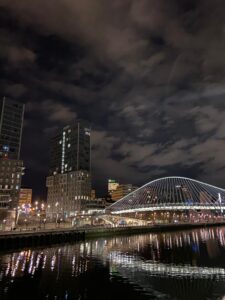
© Johann von Harling
Bilbao with modern buildings in the city center
Conclusion
An international internship is recommended for students who want to improve their language skills in a language other than their native language, are interested in new cultures, and at the same time want to experience the working style in another country within a company. Living abroad provides a different perspective on many things and broadens one’s horizons. The internship offers a very good opportunity to combine the interest in international experience with the interest in professional experience. In addition to the internship, you have the opportunity to explore new cities, different places, and another culture. Spaniards exude joy of life, which is recognizable in many everyday situations. Next to working, I really enjoyed the trips we organized either with working colleagues or with friends, where we could further explore the great cities and landscapes of Spain and discover even more how diverse this country is.
I am very glad, that I had this opportunity supported by Erasmus Internship, that offered me to experience the work culture as well as the live and culture in a different country. I hope that many people will also have this opportunity and support to experience such great possibilities.
Internship in Brussels
- Architecture B.Sc.
- Belgium, Brussels
- BC Architects
- 10/23 – 03/24
The past six months I have lived in Brussels to complete an internship at an architectural office. My decision to temporarily move here had nothing to do with the city or the country though but the specific office I would like to work at: an office focusing on sustainable architecture and earth construction. In July I had a job interview after which I was accepted quite quickly. However, there was not enough time to apply for a full Erasmus scholarship in time. Therefore, I strongly recommend everyone to get all the documents ready as soon as possible.
The hunt for an apartment or flat share went quite easily. I checked on the website „appartager“, finding lots of offers, but I was trying to look for a room in the areas of
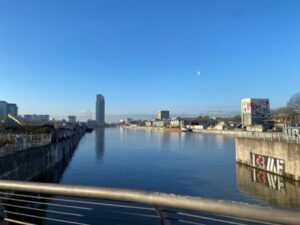
© Lea Knoch
Ixelles, St Gilles and Schaerbeek (a friend of mine recommended). I ended up in Schaerbeek, in a flat share of four people with a very friendly land lady. The location was perfect, just ten minutes from work on the bike. Since all the rooms were free, I did not know who the other flat mates will be… in the end we were all Germans.. At first we were a bit disappointed, since we would have loved a more multicultural experience but soon we discovered that we were super happy to have a little „German home“ far from home. Whether we discussed the pros and cons of German or Belgium beer or the joint hunt for the best bakery in the city (the truth: nothing can replace German bread) we had a really good time together. We spent lots of nights sitting in the kitchen, chatting, cooking or strolling through the city. In the end we became really good friends, I hope to see again at some point. Our favourite activities contained: visiting Schleiper (the place to go as a creative person, 4 stories full of paint, brushes, paper, materials, clay…) visiting (flea) markets in the Marolles and at Gare du Midi and reading books in cafes or bars. Since it feels like its always raining in Brussels, it is important to know nice places you can hide in when it starts pouring.
The city itself is not too big but feels very confusing at times. Brussels undergoes lots of changes at the moment, many architectural and urban developments are happening. Therefore, construction sites everywhere. Plus there really is a thing called „Belgian solutions“, creative ways of finding solutions to problems (sometimes not making sense) and very much in contrast to German solutions.
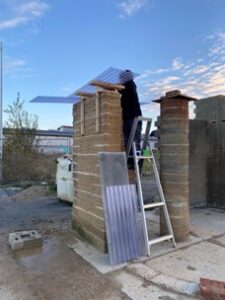
© Lea Knoch
So, unexpected things to happen everywhere and endless opportunities to explore. Although the tram system is super modern, it takes ages to move within the city if you rely on this type of transportation. Having or renting a bike is definitely the easiest way to travel around and most of the times I felt quite safe cycling in the streets.
But be aware, Brussels has some hills, so a workout is included. The neighbourhood I lived in, Schaerbeek, is a very multicultural and multinational area. The Moroccan and Turkish communities are quite large and it was reflected in the streets: lots of mini markets with stacks of fresh vegetables and fruits outside and bakeries with delicious baklava run by some of the friendliest people I have met in the city. Though I did feel like the neighbourhood is also changing, the process of gentrification has definitely started..
My internship started on the 11th of September. When I arrived I was welcomed by my supervisor and a colleague and they gave me a short tour of the office and introduced me to everyone. In the beginning I was quite overwhelmed, thinking I would never be able to remember all the names and finding my way around (although it was not too big, around 30 people working there). The first days I spent reading lots of documents and plans to get an idea of the project I was working on but quite quickly I started working on it. Three weeks later another architect joined the team for it and I very much enjoyed working with them. I was able to work on different things, designing,

© Lea Knoch
drawing plans, making models and repairing the roof of a prototype pavilion on the site. The atmosphere in the office was incredible, I never wished to be anywhere else. Everyone was super friendly, open and funny. I was also impressed that everybody got along with each other (not always like that with 30 people) and what also contributes this, I think, is the way they create lunch breaks at the office. Since the office is located near the canal of Brussels, a rather industrial area, with not many food places around (plus it it super expensive to eat out in Brussels), they created a system in which every day one person of the office cooks a meals for everybody and at lunch we sat together in the kitchen sharing the food. This way we got a nice, healthy and freshly cooked meal every day plus the opportunity to chat with everyone. Additionally, I can now claim I am able to cook a nice meal for around 25 people within two hours, a skill I never thought I would ever need nor gain!
Unfortunately, my language skills did not improve as much as I had hoped. Although I had four years of French lessons at school I did not remember a thing when I arrived. Since the people working at the office came from different countries, English was the main language to communicate within the office. Most meetings with clients were held in (Dutch or) French. I would say I am now able to understand conversations and read texts but I do not feel very comfortable talking and expressing myself in French. In the beginning I thought about joining a French class in the evening but working full time and more was already tiring and exciting enough. For the future I hope to be able to expand my knowledge since it is an beautiful language and spoken in many countries I am interested in visiting.
The overall experience at the office, at home and the city was very nice. Brussels is an open and divers city and offers activities, adventures and culture for everyone. I can only recommend!
Internship in Dublin
- BA Teacher Training for Secondary and Comprehensive Schools (English and History)
- Dublin, Ireland
- UNICEF Ireland
- 10/23 – 12/23
Internship Search / Application
I started looking for possible internships more than half a year before my planned stay abroad. Since I had completed my undergraduate degree, I thought I’d look for an internship at a school in Dublin, as it would be valuable experience as an aspiring teacher. Unfortunately, I received little to no response from the schools I contacted. So, I started looking for internship opportunities with well-known companies and organizations. I stumbled upon an unrelated job posting at UNICEF Ireland and got the idea to reach out and ask for an internship opportunity since there weren’t any current internships listed on their website. The UNICEF Head of Advocacy, who would later become my supervisor, responded to my inquiry and made it possible for me to intern at the UNICEF Ireland office in Dublin. While it did take long to find an internship, I’m glad I stayed consistent with my search and found an opportunity I knew I’d enjoy.
Accommodation & Living
Since I was interning at an office, I had to look for a place by myself. Finding accommodation in Ireland, and specifically in its capital, was a struggle. I wasn’t able to find anything suitable prior to my stay, as Ireland is currently dealing with a housing crisis, as well as due to my personal preferences. However, I did get a reply on the main property offerings website of Ireland and ended up arranging a video chat with a landlady. While the accommodation wasn’t a perfect fit due to time circumstances, the possibility to contact the landlady by phone was what ultimately helped me find a place in Dublin. I flew to Dublin a week before the scheduled stay with a parent, looked around, and viewed a couple of one-bedroom flats. I decided to call the landlady I had video chatted with and ask if there were any flats available. Thankfully, I received a positive answer and viewed the place within the same day. I rented a one-bedroom flat in a safe and quiet neighborhood south of Dublin. The rent in Ireland is extremely high and at times as high as 1600 Euros per month for my small room.
Everyday life / The internship
Some weeks during my stay abroad were monotonous, others were quite different and spontaneous. I got to attend different events and meetings for my internship, like the annual UNICEF charity lunch, which was a fancy lunch with many people from respectable companies who donate large amounts to causes through UNICEF. This was a different environment for me to be in and I was grateful for being invited despite being new to the office. Moreover, I spontaneously had to attend a conference by myself where I met lovely people with whom I got to spend time with at other charity events.
My main task during my internship was to help organize a workshop for teens on activism. I helped organize three workshops, two online and one in person. The online workshops lasted a week each, while the in-person workshops lasted just one day. I enjoyed being a part of something active and doing the work behind the scenes. This experience was highly beneficial for my degree as well because I got to speak in front of groups of teens and lead some of the activities from the workshop, something I will have to do on a daily basis in a few years.
Getting around and riding the bus was easy and cheap in comparison to Germany. The UNICEF office was a pleasant 20-minunte bus ride from the bus stop in front of my apartment building. In the office I was confronted with a yet very present work-from-home culture. Every day there were different group of people present. The space itself would not be able to handle the presence of all employees as it was relatively small with limited workspace, which was not what I expected from an office for an important organization like UNICEF. Nevertheless, it seemed to be just quite right for the staff. I was happy to be accompanied by another intern, with whom I occasionally spent my free time as well. In general, the people in the office are welcoming and interesting. It was definitely a pleasure to work alongside them.
My supervisor worked from home, so when I got to the office, I mostly worked on my own. I tried to be consistently in office everyday but later came to realize that there was no actual need to be at the office since everything was done on a computer anyway. Still, three days of the week I was at the office, the other two days I worked at the library. However, I participated in the online workshops from home.
Aside from helping to create the workshop, I was also involved in the Child Rights Schools project, an initiative that encourages schools to receive a banner from UNICEF that identifies their school as child rights recognizing schools. I attended a couple of meetings where I got to make a few small decisions and got to visit a Child Rights School in Dublin as well. It was fascinating to see and learn about other school systems, which helped me evaluate and compare the Irish school to German schools, seeing where the respective negatives and positive aspects are and to possibly apply the positive in a correct given situation.
Free time / Tips
Since I had a flexible daily schedule, I took advantage of it and explored Dublin bit by bit. Ireland’s capital is separated by the river Liffey. North Dublin is considered to be the poorer part, while the south is visually different and is home to Ireland’s most important government buildings. Dublin is also a very walkable city as well and has many beautiful parks. I especially enjoyed going for a stroll at sunset at the park that was just two minutes from my flat. Moreover, I found it fascinating to be so close to the sea. I enjoyed going on day trips to Howth, Bray and Greystones. The train ride is just half an hour, and the view is just terrific as the train passes by the sea. I recommend getting a Youth bus / train card, which allows you to travel around at a cheap price compared to the visitor’s card.
Moreover, I enjoyed exploring the city at my own pace, especially during the holiday spirit, and planning spontaneous outings. In terms of getting to know new people, got to know some interesting people at the charity events I attended and definitely made same life-long friends.
Conclusion
All in all, my three months spent abroad haven been unforgettable experience for me. Ireland is a great country to take your first independent steps in, as it is familiar enough like any other EU country but, of course, a new place to make great new memories. I was filled with a new energy from the friendly Irish people, which made my stay even more enjoyable than I had hoped. Despite the high rent, I can definitely see myself returning for work or further study or even just for a nice little summer stay, just to enjoy the sea with a bit more sun and less wind.
Internship in Sweden
- Energy Engineering M.Sc.
- Sweden, Tranas
- Bosch Thermoteknik AB
- 09/2023 – 03/2024
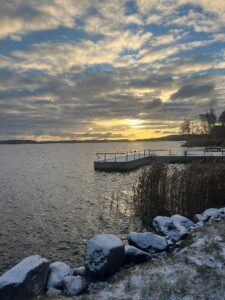
© Anna Bley
Internship Search:
When I was on the hunt for an internship abroad, I turned to LinkedIn to check out job listings in countries and cities I was interested in. It was a pretty straightforward way to find some cool opportunities. I also spent some time browsing through the websites of companies I liked, hoping to stumble upon any international gigs. That’s how I came across an internship listing for Sweden on one company’s site, and I wasted no time in applying. Both methods worked out pretty well for me, so I’d definitely recommend giving them a shot to widen your search.
Accommodation & Living:
During my internship, I ended up in Tranås, a cozy town in Sweden’s Jönköping province. The company sorted out our living arrangements in a wing of a golf hotel, which was a short drive from where we worked. Each of us had our own room, fully furnished with everything we needed, and we shared common areas like the kitchen and living room. The hotel also had some cool extras like laundry facilities, a gym, and even a sauna. Plus, it was right by Lake Sommen, which was perfect for relaxing after work.
Getting around was a breeze too, thanks to the company providing us with three cars to use. They covered all the costs, which made things a lot easier. Having accommodation sorted out by the company made settling in a lot smoother, and with 13 of us from different parts of the world, it was easy to make friends and feel at home.
Everyday Life/Internship Experience:
Swedes are really good at English, so communicating with everyone was no problem at all. But they definitely appreciate it when you make an effort to speak a bit of Swedish too. I used Duolingo to learn some basics, and it definitely helped me feel more connected.

© Anna Bley
Starting a new job in Sweden means getting into the Fika tradition, where you take breaks with your team for coffee and snacks. It’s a great way to bond and chat about stuff. The office vibe is pretty relaxed too – even the big bosses wear jeans and T-shirts to meetings.
When it comes to work, everyone’s pretty chill and informal. It’s all about working together as a team, and everyone’s opinion matters, no matter their position. I was pleasantly surprised by how much my input was valued as an intern. The work culture is all about trust and giving people the freedom to do their thing. Swedes take a lot of pride in their work and love showing off their company logos.
Free Time/Tips:
Getting outdoors is a big thing in Sweden, no matter what time of year it is. Thanks to the Right of Public Access, you can explore nature, pick berries, and even camp out pretty much anywhere (as long as you’re respectful). Camping around Lake Vättern is a must-do, with plenty of shelters and awesome trails to check out.

© Anna Bley
Weekends are perfect for exploring nearby towns like Gränna and Eksjö, or even bigger cities like Linköping and Jönköping. And if you’re up for it, why not take a trip to Gothenburg or Stockholm? Both cities are just a few hours away by train and totally worth it. Gothenburg, especially around Christmas time, is super charming and definitely worth a visit.
And don’t leave Sweden without going on an elk safari – it’s a blast! We booked one near Eksjö in December, and it was so much fun. If you can, try to go during the winter when everything’s covered in snow – it makes the whole experience even more magical.
The best part of my time in Sweden was the trip to Swedish Lapland. We stayed at Camp Alta near Kiruna and did all sorts of cool stuff like snowmobiling and seeing the Northern Lights. Even though it was freezing cold, it was an experience I’ll never forget.
Conclusion:
Sweden has something for everyone, whether you’re into winter sports or just chilling out in nature. The work culture is super relaxed, and people are really friendly and welcoming. Whether you’re grabbing a coffee with your team or exploring the great outdoors, Sweden is the perfect place for an internship adventure.
Research Internship in Tarragona
- Chemistry M.Sc.
- Spain, Tarragona
- Institut Català d’Investigació Química
- 10/2023 – 02/2024
1. Application/Finding an internship
Before I applied for the research internship I did not have a clear idea which place to go. During the course of the chemistry master in Aachen it is necessary to do two to three research internships and I knew that I wanted to do one of them abroad. So, I asked the supervisor of my bachelor thesis whether he can recommend me some places to go. He directed me to a professor at the ICIQ in Tarragona which is a non-university research institute, perhaps comparable to the Max-Planck institutes and the likes in Germany. From looking at the group’s website I found the chemistry interesting and so I sent an e-mail with an application to the professor at ICIQ. He replied that he would be happy to host me, so we filled the required paperwork for the Erasmus internship.
2. Accommodation & Living expenses
When dealing with the bureaucracy of the stay, a secretary of ICIQ offered me a studio apartment of ca. 20 sqm total to rent. Despite its small size it was outfitted with everything one needs, like an oven, stove, refrigerator and washing machine. The biggest drawback was that I did not have a real bed but slept on a sofa bed instead. Looking back now I should have looked for a flat myself to first meet people outside of work and second because it was quite expensive (650 € per month), thereby consuming almost the entire Erasmus scholarship. There are cheaper options in Tarragona even though it was located in part alta, which is the historic centrum of the city. Travelling to Tarragona from Germany by ‘green’ means is relatively easy. There is a direct Flixbus connection from Cologne to Barcelona, taking about 18 h. This has the advantage that one piece of luggage is already included and more can be bought for 5 € a piece. From Barcelona it is only a short train ride to reach Tarragona. As far as I know there are no student dormitories like in Germany in Spain or they exist to a much smaller extent. Moreover, it is more common to continue living with one’s parents while studying so there is not something like a student quarter in the city.
Living in the historic center of the city has the advantage of being close to the historic landmarks of Tarragona, the cafes and restaurants as well as many cultural events such as the carnival celebrations. On the flipside the ICIQ is located on the outskirts of the city. Because of this, the walking distance to work was almost half an hour each way. Apart from the cost of the studio, I would say the living expenses are quite similar to Germany. Groceries are roughly the same price, but I really enjoyed the Spanish vegetables quality. I recommend to get a Spanish SIM card as the services are much cheaper than in Germany. There was no WiFi in my flat but I got 100 GB of prepaid mobile data for 20 € a month so I just used my phone’s hotspot for accessing the internet from other devices. If one has a Spanish bank account and is therefore eligible to get a plan it can be even cheaper.
However, I spent more money per month than I usually do because I went out much more. In my experience the culture in Spain is very different in that regard to Germany. I rarely met up with people at one’s home as you would do in Germany. Instead we went to the many, always well filled cafes and restaurants, for example to have some olives and vermouth in the afternoon. I spend a lot of time with my colleagues who were very welcoming and generally super nice people.
3. Everyday life/The internship
On a typical day I would wake up at around 8 am, have breakfast and then walk to the institute, so I would arrive around 9 am, if there were no meetings with the group or presentations scheduled earlier. We had one weekly group meeting in which several members of the group had to present their recent work which was then discussed among the group. Moreover, further regular group activities included literature, in which someone from the group presents a recent paper and subsequently leads the discussion in the group, topic, a more extensive version of literature where the basics of the specific niche are also explained and problem session. In this activity a member of the group prepares a total synthesis, removes some of the information like the products and/or conditions of the individual reactions and the group then has to figure out the synthesis and the mechanisms of the separate steps. I think most of these activities are pretty standard in academic groups in chemistry.
Apart from this we had subgroup meetings every three weeks to discuss our results and what needs to be done in the future more personally with the professor. The majority of my time in the institute I spent doing chemistry and trying to make the things work we talked about in subgroup meetings. In general, I had a lot of freedom after being put on one of the group’s project in the beginning in regard to which things I wanted to achieve and the methods used to get there within this project, which I really liked. I always felt like my opinion was valued and respected and there was a great sense of equality within the group. I never had the feeling that some of the PhD students or Post-Docs looked down on me or automatically valued my opinion less because I am a master student, which in my experience cannot be taken for granted.
The same applies to the use of the group’s and institute’s equipment. Everyone had the same rights in the access to it. Both the group and institute have great equipment. For example, the supply with glass-ware and technical equipment like GCs, LC-MS, GC-MS, glove-boxes etc. in the group is excellent. The institute shares more equipment like several NMR machines, which almost always made for very quick measurement times. Also, the institute hosts a whole analytics department, where one can submit among others HRMS and X-ray samples. In addition, there is a HPLC unit which can separate small quantities of sample for you. The digital equipment is very modern as well. There is a well-working chemical inventory for the single work groups and the institute as a whole. Everyone uses a digital lab journal to track their experiments, making it very easy to share results and procedures with colleagues. Though, because I am a master student, I was not provided with a PC at work and had to bring my own laptop every day.
Since there were many people in my group, I had to share my fume hood for the last one and a half months of my stay. Because the fume hoods are big this was not too much of an issue. The laboratories are quite large, in my group there were seven to ten people in one lab. Unfortunately, the ICIQ currently does not have canteen. There is one at the nearby campus of the university URV but it is not comparable to the mensa in Aachen. Prices are generally much higher (comparable to the prices for external people in mensa) and most days there are little to no vegetarian options. Because of this almost everyone brings their own food to work every day, so I had my lunch in the break room with my colleagues most days.
Most days I stayed in the laboratory until between 6 to 8 pm. On weekdays the institute is opened from 7 am to 10 pm and Saturdays from 7 am to 5 pm while it is closed on Sundays. I only worked on Saturdays on exception and I want to highlight that I worked these relatively long hours because of my own choosing as I really liked the chemistry I was doing and wanted to make progress. Nobody put on any pressure on me to work as much as I did and when I wanted a few vacation days it never posed any problem. Same as with the exact contents of my research I enjoyed a lot of freedom in my working hours. If one wants to have a more time off during an internship it is definitely possible.
In the beginning of my stay I had to undergo a lot of safety instructions like written tests, a presentation and a walk through the institute. I was provided by the institute with two lab coats and safety glasses. About one month into my stay I got into a laboratory accident were a splash of DCM entered my eye. Luckily, my lab colleagues were quick to aid me and washed my eye first with a special solution intended for these purposes and then water. They also alarmed the institution’s security department. A worker of this department then continued to wash my eye with salt water before taking me and a Spanish-speaking coworker to the hospital, where an ophthalmologist checked my eye for lasting damage. Luckily, there was no such damage and I was prescribed antibacterial eye drops. Nevertheless, my eye got infected because of the irritation caused by the DCM and I had to go to the hospital two more times during the next week. In the end it healed perfectly fine and I have no damage in my eye. The insurance of the institute handled everything with the hospital great so it was not stressful for me in that regard and I am very grateful to the lab mates and ICIQ employees who helped me.
The language of my stay was English as my group was very international, with only about 25 % of the group members being Spanish. Therefore, all communication within the group was in English. I do not know whether my language skills got better during the stay as I like to think that I was quite proficient before. Before the internship I also studied Spanish in university for a semester and longer in private. Unfortunately, I do not believe that it got much better during the stay. First of all, as discussed before I did not use it at work and second in my experience many people outside of work preferred to speak Catalan instead of Spanish (which are two different languages) as Tarragona is located in Catalonia. When they noticed I did not speak Catalan many switched to English right away. This meant I spoke very little Spanish during my stay.
Possibly because of the group’s internationality many group members do not know too many folks outside of work in the city, so we spend a lot of time outside of work together. Big cultural events like Christmas were also celebrated in the institute with the Catalan traditions or within the group. For example, we went to a fire place to do Calçotada with the group. In this tradition spring onions are burned in a fire. The outer layers are removed and the spring onion is eaten whole with a special sauce. I much appreciate that I got to experience these traditions.
4. Free time/Tips
A great way to spend part of the weekend is to support the local football club Gimnàstic de Tarragona (often abbreviated to Nàstic) in their fight for promotion to the second Spanish league. Usually about 5.000 to 10.000 people visit their games, creating a vibrant atmosphere, even though it cannot quite compete with Alemannia Aachen ;). Tarragona used to be an important roman city (named Tarraco), as it was their first permanent settlement on the Iberian Peninsula. Since the city’s population remained smaller than at its peak height in roman times until well into the 19th century a lot of the roman architecture is still standing today. The amphitheater located directly at the beach for example is part of the UNESCO world heritage. It is among six attractions from antique times and the middle ages which can be visited with a bundled pass for 15 €, an investment that is well worth its money. The surroundings of Tarragona also feature nice nature and hiking paths to explore it. For example, I once hiked to the roman aqueduct which is located 4 km outside of the city and its impressive to imagine that it has stood there for 2.000 years.
If you like climbing there is also a famous rock climbing area outside of the nearby city of Reus. Reus and Tarragona have kind of a rivalry going on as they are by far the biggest cities in the area. Reus can be reached by a regular bus service from Tarragona in about 30 minutes. I often went there as there unfortunately is no climbing gym in Tarragona but there is an excellent one in Reus I can recommend. Apart from this the city of Reus is surely worth a visit on its own. In the Christmas time there are nice markets where once can buy artisanal foods or typical Christmas accessories of the region like a Caga tió or the Caganers. Most smaller cities around Tarragona can also be reached by bus services. In addition, Barcelona is connected by rail to Tarragona. The ride takes 1 h 15 min to 1 h 45 min, depending on the train, allowing for many weekend trips. Supporting this is a current promotion of the Catalan railways in which one can buy an indefinite use ticket for four months for a specific route for only 20 €. If within this timespan one uses it at least 16 times, you even get the 20 € back! Tarragona possesses a separate high-speed train station on the route Barcelona-Madrid as well. This station is located 8 km outside the city, so it is connected to the city center by bus. From there, travelling to Madrid takes only two hours and connects to the whole Spanish high-speed rail grid.
Furthermore, Tarragona is located on the Mediterranean Sea and has some beautiful sand beaches alternating with small cliffs, so I often enjoyed taking evening walks along the coastline. Up until the middle of November the water was also still warm enough for me to enjoy swimming in the sea. Many people possess beach volleyball sets, so during the summer the beach is filled with beach volleyball courts. Obviously during the winter, the weather is much better than in Germany. The temperature rarely dropped below 10 °C and sometimes exceeded 20 °C in February, enabling outdoor activities year-round. Once a week I played football on a pitch belonging to a nearby school with a group of students and workers of the ICIQ and the nearby university URV.
Before I mentioned that I went out a lot for food and drinks. As a vegetarian I would say it is a little harder than in Germany when eating out. When going out for Tapas there are usually enough vegetarian options (at some places you might have to order every available one to get fed) but otherwise one can sometimes be somewhat restricted to only one to three dishes to choose from in total. In the worst case, almost every place offers Patatas Bravas, so one can reliably fall back on that. Vegan options however can be much direr, so you should check beforehand if there is something available for you. When cooking for myself though I found myself in paradise. The vegetable quality and variety available is amazing so vegetarian or vegan cooking is a blast.
5. Conclusion
Looking back, I had a great time in Tarragona. The people I met were super nice and welcoming. I hope that I have made some lasting friendships. Also, I experienced some Catalan culture, like carnival, the Christmas traditions or Calçotada. In and around Tarragona there are many cool options to spend one’s leisure time. Regarding the work I experienced a lot of freedoms and I found the chemistry I did super interesting. I also really liked the culture and atmosphere at ICIQ. Therefore, I can wholeheartedly recommend a stay in Tarragona and I will definitely come back either for vacation or to work.


